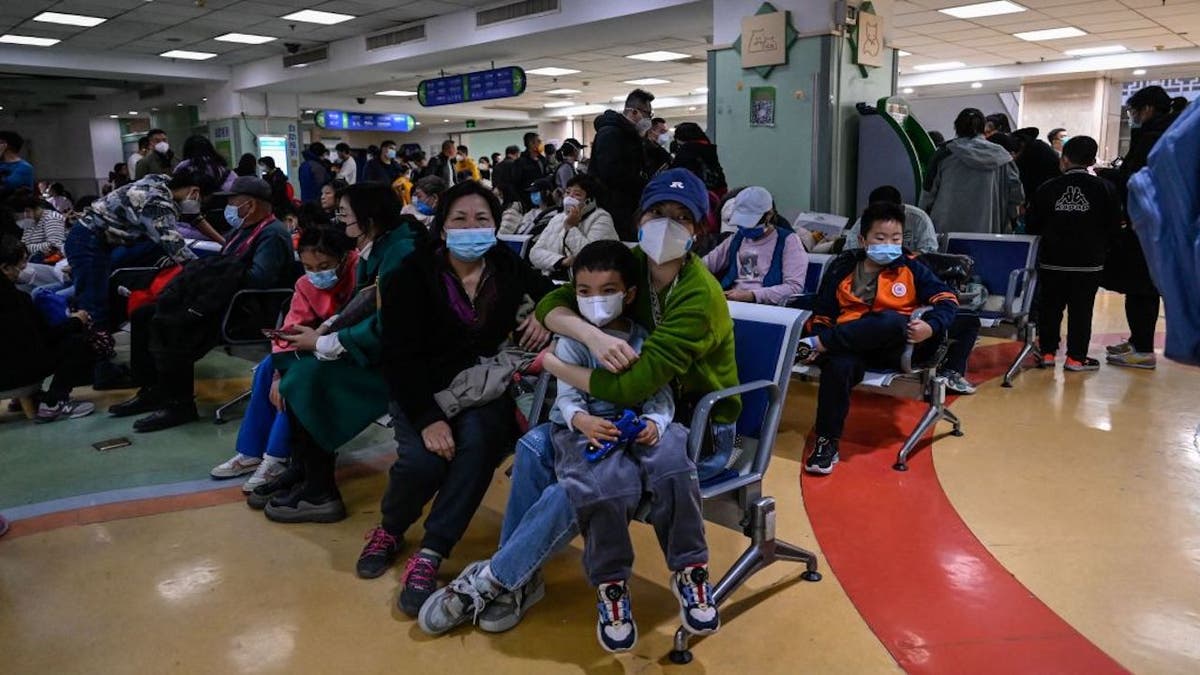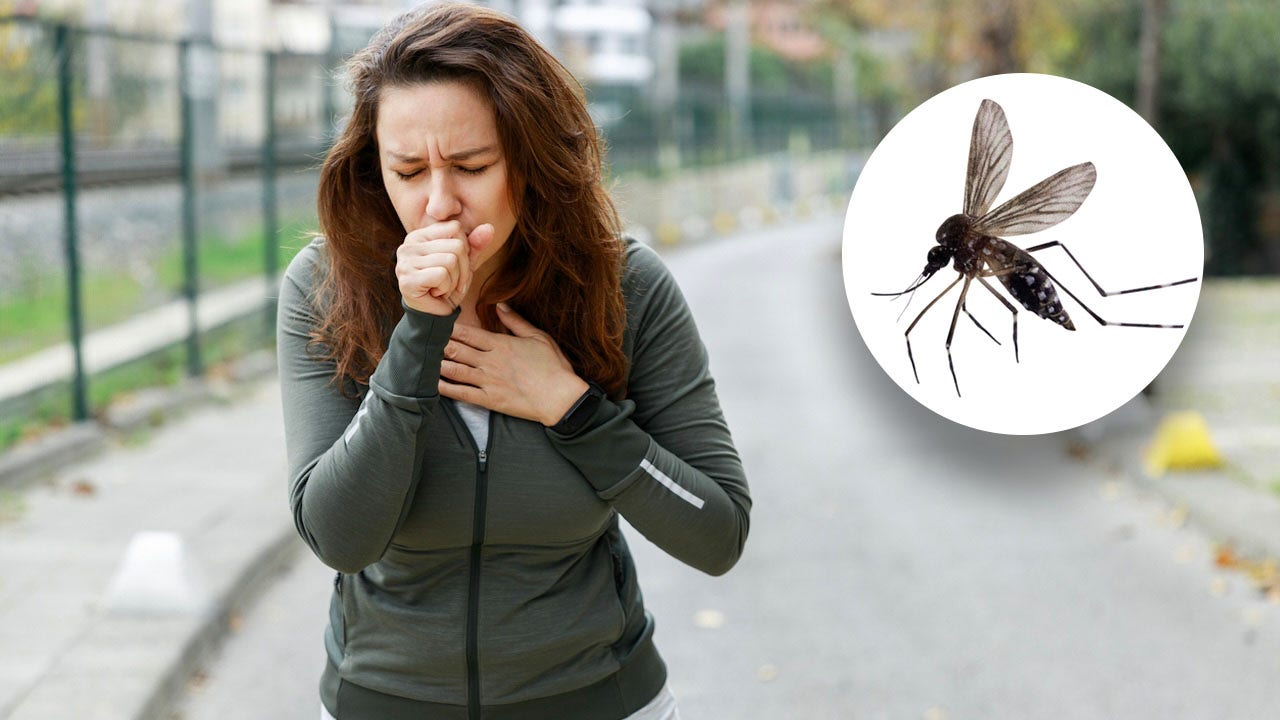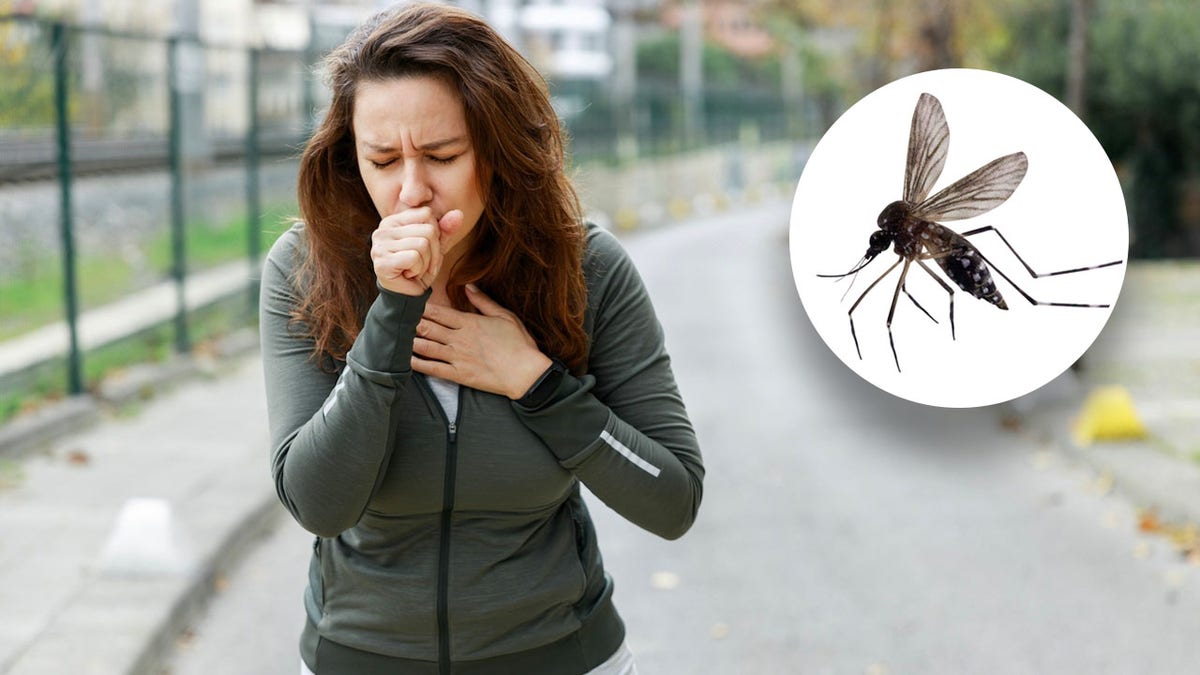Health
Childhood pneumonia surge reported in Netherlands amid outbreak in China

Childhood pneumonia cases are surging in the Netherlands, a health agency in the country has reported.
During the week of Nov. 13-19, there were 103 pneumonia cases in the Netherlands out of every 100,000 children between the ages of 5 and 14.
That was an increase from 83 the prior week, according to the Netherlands Institute for Health Services Research (NIVEL).
COLD, FLU, COVID-19 AND RSV: HOW TO IDENTIFY THE DIFFERING SYMPTOMS AND STAY SAFE
This is a significant increase over the peak of the 2022 flu season, when the country recorded 58 cases of pneumonia per 100,000 children.
Cases are also rising among children age 4 and under in the Netherlands, rising from 124 to 145 per 100,000 within that same timeframe.
Childhood pneumonia cases are surging in the Netherlands, a health agency in the country has reported. (iStock)
China has also seen an unexplained increase in childhood pneumonia cases and other respiratory illnesses.
ProMED, the global digital disease surveillance system, reported on Monday that Chinese hospitals — primarily in Beijing — have become “overwhelmed with sick children” as a result of the pneumonia outbreak.
FOR COLD AND FLU TREATMENTS, DO YOU NEED A PRESCRIPTION OR ARE OVER-THE-COUNTER MEDS GOOD ENOUGH?
At a press conference on Nov. 13, officials from the Chinese National Health Commission blamed the spike on the lifting of COVID-19 restrictions, as this is the first flu season since the country eased its strict lockdown measures.
Chinese officials also attributed the increase to the spread of other infectious diseases, including the flu, RSV, SARS-COV-2 and a bacterial infection called mycoplasma pneumoniae, according to a statement on the World Health Organization (WHO) website.

In the week of Nov. 13-19, there were 103 pneumonia cases out of every 100,000 children between the ages of 5 and 14 in the Netherlands. (iStock)
On Nov. 22, WHO said it requested “additional epidemiologic and clinical information” from China — as well as laboratory results from the affected children.
“We have also requested further information about recent trends in the circulation of known pathogens, including influenza, SARS-CoV-2, RSV and mycoplasma pneumoniae, and the current burden on health care systems,” the agency said in its statement.
“They were locked down for all of 2022, and when you release the lockdown, all of the upper respiratory viruses — RSV, influenza, COVID — came roaring back.”
“WHO is also in contact with clinicians and scientists through our existing technical partnerships and networks in China.”
To reduce the risk of spreading respiratory illness, WHO recommends that people in affected areas stay up to date with vaccinations, maintain distance from people who are ill, stay home when sick, seek medical care as needed, wear masks as appropriate and wash hands regularly.
‘Immune pause’ could be culprit, doctor says
Dr. Marc Siegel, clinical professor of medicine at NYU Langone Medical Center and a Fox News medical contributor, appeared on “Fox & Friends” on Tuesday to share his opinion on the surge.
FOR COLD AND FLU TREATMENTS, DO YOU NEED A PRESCRIPTION OR ARE OVER-THE-COUNTER MEDS GOOD ENOUGH?
While the doctor said he is a bit skeptical about China’s and WHO’s assertions that “everything’s OK,” he said he also believes this may be the same phenomenon that the U.S. experienced last year, which he calls “immune pause.”

Children and their parents wait at an outpatient area at a children’s hospital in Beijing on Nov. 23, 2023. The World Health Organization has asked China for more data on a respiratory illness spreading in the north of the country, urging people to take steps to reduce the risk of infection. (Getty Images)
“They were locked down for all of 2022, and when you release the lockdown, all of the upper respiratory viruses — RSV, influenza, COVID — come roaring back,” Siegel said.
Another potential issue is that China is seeing an uptick in the mycoplasma bug.
DC AREA HOSPITALS REPORT UPTICK IN SICK VISITS AS GLOBAL CONCERN FOR RESPIRATORY ILLNESSES GROWS
“They’re flooding this bacteria with a Z-Pac — and when you give a Z-Pac to too many people, you get a resistant mycoplasma, and you can end up in the hospital,” the doctor warned.
“So I think a combination of all of those things is our answer here.”
For people in high-risk groups, including those over the age of 65, Siegel recommends getting the pneumococcal vaccine, as well as vaccines for RSV and flu.
CLICK HERE TO SIGN UP FOR OUR HEALTH NEWSLETTER
Edward Liu, M.D., infectious diseases section chief at Hackensack Meridian Jersey Shore University Medical Center, noted that historically, RSV and flu have caused respiratory infections during the winter season.
“Sudden surges in respiratory infections could be explained by RSV and flu,” he told Fox News Digital.
“Last year was particularly bad for RSV affecting children in the U.S.”

“Sudden surges in respiratory infections could be explained by RSV and flu,” a doctor told Fox News Digital. “Last year was particularly bad for RSV affecting children in the U.S.” (iStock)
“I think people are worried about new respiratory infections showing up, even in other countries, as we have found out how quickly a respiratory virus can spread internationally,” Liu went on. “No one wants another pandemic.”
The doctor added that novel infections cannot be easily detected by commercial laboratory tests.
“Also, some hospitals don’t have the newer, more advanced respiratory virus testing to pick up common respiratory pathogens,” Liu noted.
“It makes sense for the WHO and/or CDC to assist China and the Netherlands in determining the cause of these respiratory infections.”
For more Health articles, visit www.foxnews.com/health.

Health
What Happens If You Eat Eggs Every Day? Nutritionists Share the Benefits

Sign Up
Create a free account to access exclusive content, play games, solve puzzles, test your pop-culture knowledge and receive special offers.
Already have an account? Login
Forgot your password?
Get back to the Sign In
Use left and right arrow keys to navigate between menu items.
Use escape to exit the menu.
Health
Ask a doctor: ‘I swallowed a bug — now what should I do?'

Most people have experienced that moment of discomfort when they realize a bug has wound up where it shouldn’t be — in their windpipe.
That includes Taylor Swift, who on more than one occasion has accidentally swallowed a bug while performing on stage in front of thousands of people.
It can be a startling and somewhat disgusting occurrence — but is this dangerous, or just a nuisance?
LOCAL DENGUE FEVER CASES CONFIRMED IN FLORIDA KEYS, SPREAD BY MOSQUITO BITES
Dr. Raj Dasgupta, a quadruple board-certified physician in California, shared with Fox News Digital the true impacts of accidentally swallowing a bug, and the best thing to do if it happens.
“Swallowing a bug can often happen accidentally when you’re eating or drinking outside, or if a bug flies into your mouth,” Dasgupta, who serves as chief medical advisor for Fortune Recommends, told Fox News Digital via email.
Dr. Raj Dasgupta, a quadruple board-certified physician in California, discussed the impact of accidentally swallowing a bug — and the best thing to do if it happens. (Sleepoplis)
“It can also happen if you’re talking or laughing outdoors. Sometimes it might even happen indoors if bugs are in your food or drink and you don’t realize it.”
ASK A DOCTOR: ‘HOW CAN I PREVENT SCARRING FROM BUG BITES AND POISON IVY?’
Swallowing a bug is usually not dangerous, Dasgupta noted.
“The stomach’s digestive acids usually break down the bug, and it is passed out of the body without causing harm,” he said.

“Swallowing a bug can happen accidentally when you’re eating or drinking outside, or if a bug flies into your mouth,” the doctor told Fox News Digital. (iStock)
If the bug carries harmful bacteria or parasites, however, it could cause gastrointestinal issues or allergic reactions, according to the doctor.
The type of bug can make a difference, he said.
“Bugs like beetles or ants are less of a concern, but bugs that are known to spread diseases — such as mosquitoes — might be riskier.”
If you happen to swallow a bug, drinking some water can help wash it down, Dasgupta said.

Taylor Swift has announced the accidental swallowing of bugs, mid-concert, on more than one occasion. (Marcelo Endelli/TAS23/Getty Images for TAS Rights Management)
“If you start feeling sick, like abdominal pain, vomiting or nausea, keep an eye on your symptoms,” the doctor said.
If you have severe stomach pain, ongoing vomiting, trouble breathing, or swelling, rash or itching, Dasgupta said to see a doctor.
CLICK HERE TO SIGN UP FOR OUR HEALTH NEWSLETTER
“If you know the bug could have diseases or if you have health conditions that might complicate things, it’s a good idea to get checked out to be safe,” he added.
For more Health articles, visit www.foxnews/health
Some bugs — including grasshoppers, beetles, termites, mealworms and even stink bugs — are actually considered edible in certain countries, and are prepared and eaten as part of meals, according to WebMD’s website.
Health
“I’m a Dietitian, and Here’s Why an Overly Restrictive Diet Can Backfire”

Sign Up
Create a free account to access exclusive content, play games, solve puzzles, test your pop-culture knowledge and receive special offers.
Already have an account? Login
Forgot your password?
Get back to the Sign In
Use left and right arrow keys to navigate between menu items.
Use escape to exit the menu.
-

 World1 week ago
World1 week agoOne dead after car crashes into restaurant in Paris
-

 Midwest1 week ago
Midwest1 week agoMichigan rep posts video response to Stephen Colbert's joke about his RNC speech: 'Touché'
-

 News1 week ago
News1 week agoVideo: Young Republicans on Why Their Party Isn’t Reaching Gen Z (And What They Can Do About It)
-

 Movie Reviews1 week ago
Movie Reviews1 week agoMovie Review: A new generation drives into the storm in rousing ‘Twisters’
-

 News1 week ago
News1 week agoIn Milwaukee, Black Voters Struggle to Find a Home With Either Party
-

 Politics1 week ago
Politics1 week agoFox News Politics: The Call is Coming from Inside the House
-

 News1 week ago
News1 week agoVideo: J.D. Vance Accepts Vice-Presidential Nomination
-

 World1 week ago
World1 week agoTrump to take RNC stage for first speech since assassination attempt















